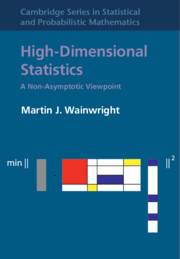Refine search
Actions for selected content:
2348 results in Statistical theory and methods
Subject index
-
- Book:
- High-Dimensional Statistics
- Published online:
- 12 February 2019
- Print publication:
- 21 February 2019, pp 540-547
-
- Chapter
- Export citation
2 - Basic tail and concentration bounds
-
- Book:
- High-Dimensional Statistics
- Published online:
- 12 February 2019
- Print publication:
- 21 February 2019, pp 21-57
-
- Chapter
- Export citation
7 - Sparse linear models in high dimensions
-
- Book:
- High-Dimensional Statistics
- Published online:
- 12 February 2019
- Print publication:
- 21 February 2019, pp 194-235
-
- Chapter
- Export citation
Acknowledgements
-
- Book:
- High-Dimensional Statistics
- Published online:
- 12 February 2019
- Print publication:
- 21 February 2019, pp xvii-xviii
-
- Chapter
- Export citation
Frontmatter
-
- Book:
- High-Dimensional Statistics
- Published online:
- 12 February 2019
- Print publication:
- 21 February 2019, pp i-vi
-
- Chapter
- Export citation
11 - Graphical models for high-dimensional data
-
- Book:
- High-Dimensional Statistics
- Published online:
- 12 February 2019
- Print publication:
- 21 February 2019, pp 347-382
-
- Chapter
- Export citation

High-Dimensional Statistics
- A Non-Asymptotic Viewpoint
-
- Published online:
- 12 February 2019
- Print publication:
- 21 February 2019
Chapter 21 - Ambiguity and Other Complexity-related Aversions
-
- Book:
- Ignorance and Uncertainty
- Published online:
- 30 November 2018
- Print publication:
- 13 December 2018, pp 255-266
-
- Chapter
- Export citation
Author Index
-
- Book:
- Ignorance and Uncertainty
- Published online:
- 30 November 2018
- Print publication:
- 13 December 2018, pp 283-284
-
- Chapter
- Export citation
Chapter 14 - Cooperation
-
- Book:
- Ignorance and Uncertainty
- Published online:
- 30 November 2018
- Print publication:
- 13 December 2018, pp 171-184
-
- Chapter
- Export citation
Chapter 20 - Coordination
-
- Book:
- Ignorance and Uncertainty
- Published online:
- 30 November 2018
- Print publication:
- 13 December 2018, pp 243-254
-
- Chapter
- Export citation
Part I - Modeling Challenges
-
- Book:
- Ignorance and Uncertainty
- Published online:
- 30 November 2018
- Print publication:
- 13 December 2018, pp 7-8
-
- Chapter
- Export citation
Chapter 16 - Information Aggregation in Markets
-
- Book:
- Ignorance and Uncertainty
- Published online:
- 30 November 2018
- Print publication:
- 13 December 2018, pp 199-208
-
- Chapter
- Export citation
Contents
-
- Book:
- Ignorance and Uncertainty
- Published online:
- 30 November 2018
- Print publication:
- 13 December 2018, pp ix-x
-
- Chapter
- Export citation
Chapter 7 - Mechanism Design
-
- Book:
- Ignorance and Uncertainty
- Published online:
- 30 November 2018
- Print publication:
- 13 December 2018, pp 78-91
-
- Chapter
- Export citation
Chapter 18 - Attrition
-
- Book:
- Ignorance and Uncertainty
- Published online:
- 30 November 2018
- Print publication:
- 13 December 2018, pp 221-230
-
- Chapter
- Export citation
Miscellanea
-
- Book:
- Ignorance and Uncertainty
- Published online:
- 30 November 2018
- Print publication:
- 13 December 2018, pp 267-282
-
- Chapter
- Export citation
Chapter 2 - Ignorance and Uncertainty
-
- Book:
- Ignorance and Uncertainty
- Published online:
- 30 November 2018
- Print publication:
- 13 December 2018, pp 15-24
-
- Chapter
- Export citation
Chapter 13 - Reputation
-
- Book:
- Ignorance and Uncertainty
- Published online:
- 30 November 2018
- Print publication:
- 13 December 2018, pp 157-170
-
- Chapter
- Export citation
Frontmatter
-
- Book:
- Ignorance and Uncertainty
- Published online:
- 30 November 2018
- Print publication:
- 13 December 2018, pp i-vi
-
- Chapter
- Export citation
